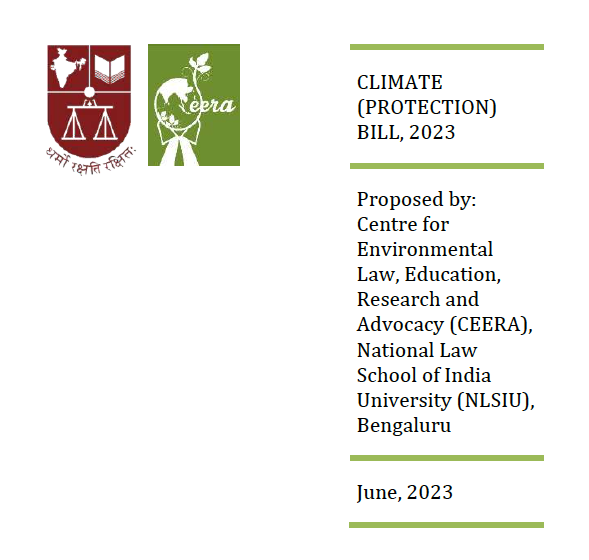– by Emma Shensher and Prof. Kirk W. Junker A Brief Historical Context for European Restoration Regulation It would be a sad competition to determine which crisis is the most urgent. Although climate disruption may well win this competition, other crises demand redress, including legal redress. One such other crisis is ecosystem restoration. Ecosystem restoration […]Read More
Examining the Doctrine of Veil-Piercing vis-à-vis Environmental Parent Company Liability in India
– Gayathri Gireesh,* Pradnesh Kamat** & Viraj Thakur*** A corporate veil essentially grants companies a separate legal personality,[1] implying that the rights and obligations of a company are distinct from that of its members.[2] This limits the liability of the members and insulates them from the actions of the company, thus incentivizing investments and leading […]Read More
GUARDING GREEN CLAIMS: INDIAN APPROACH TOWARDS A SUSTAINABLE FUTURE
– By Riddhi Paritosh Vyas* BACKGROUND In today’s world, an increasing number of consumers are showing a preference for purchasing products and services that are marketed as environmentally friendly. Supermarkets, grocery stores, and e-commerce platforms offer a wide variety of products – ranging from cereal to soft drinks, cleaning products to clothing, and skincare to […]Read More
ENVIRONMENTAL RESTORATIVE JUSTICE: AN EMERGING PARADIGM IN ENVIRONMENTAL GOVERNANCE
– Prof. (Dr.) Sairam Bhat* & Vikas Gahlot** Against the backdrop of continuously escalating global environmental crisis, the United Nations General Assembly has proclaimed the years 2021-2030 as the “Decade on Ecosystem Restoration” – a global clarion call that aims to “prevent, halt and reverse” the degradation of ecosystems worldwide.[1] The objectives of the UN […]Read More
GREEN CREDIT AND CLIMATE ACTION: AN ANALYSIS OF GREEN CREDIT RULES, 2023
–by Gayathri K K[1] and Mr. Balabadruni Naga Satwik[2] INTRODUCTION Green Credit Rules were notified by the Ministry of Environment Forest and Climate Change (MoEFCC) on 12th October 2023, giving legal validity to Green Credit Programme (GCP) in India.[3] GCP becomes part of several programs and schemes India has launched in a bid to adhere […]Read More
QUASI-DECRIMINALISATION IN ENVIRONMENTAL LAWS IN INDIA: AN EVALUATION
– Prof. (Dr.) Sairam Bhat* & Jaibatruka Mohanta** Introduction The Parliament of India recently enacted the Jan Vishwas (Amendment of Provisions) Act, 2023 (Amendment).[1] It received the President’s assent on August 11, 2023,[2]and aims at decriminalizing and rationalizing violations to further enhance trust-based governance and for ease of living and doing business. This one legislation […]Read More
STRAY DOGS AND CATTLE MANAGEMENT- TOWARDS A HUMANE APPROACH
Prof. Sairam Bhat[1] and Gayathri K K** Introduction In the month of March 2023, two sets of Rules were issued in a gap of mere 10 days under the Prevention of Cruelty to Animals Act (PCA Act) of 1960. This is probably necessitated due to several judicial orders from different High Courts and also the […]Read More
REIMAGING FOREST GOVERNANCE – APPRAISAL OF THE FOREST [CONSERVATION] AMENDMENT ACT 2023
Prof. Sairam Bhat,* Vikas Gahlot,** Jaibatruka Mohanta*** Introduction The recently passed Forest (Conservation) Amendment Act, 2023[1] introduces significant legislative revisions to the Forest (Conservation) Act, 1980 (FCA), which is a pivotal environmental legislation in India regarding forest conservation. Enacted in 1980, The FCA (now the Van (Sanrakshan Evam Samvardhan) Adhiniyam, 1980) is one of the […]Read More
A CRITICAL ANALYSIS OF PRICE VARIATION IN GOVERNMENT CONTRACTS
An Article on Price Variation in Government Contracts by Prof. (Dr.) Sairam Bhat, Ms. Aparna Sojan & Mr. Jaibatruka Mohanta. How to Cite: Sairam Bhat, Aparna Sojan & Jaibatruka Mohanta, A Critical Analysis of Price Variation in Government Contracts, 12(2) Bangalore University Law Journal 42 (2022). Read More







![REIMAGING FOREST GOVERNANCE – APPRAISAL OF THE FOREST [CONSERVATION] AMENDMENT ACT 2023](https://ceerapub.nls.ac.in/wp-content/uploads/2023/09/Forest.jpeg)

